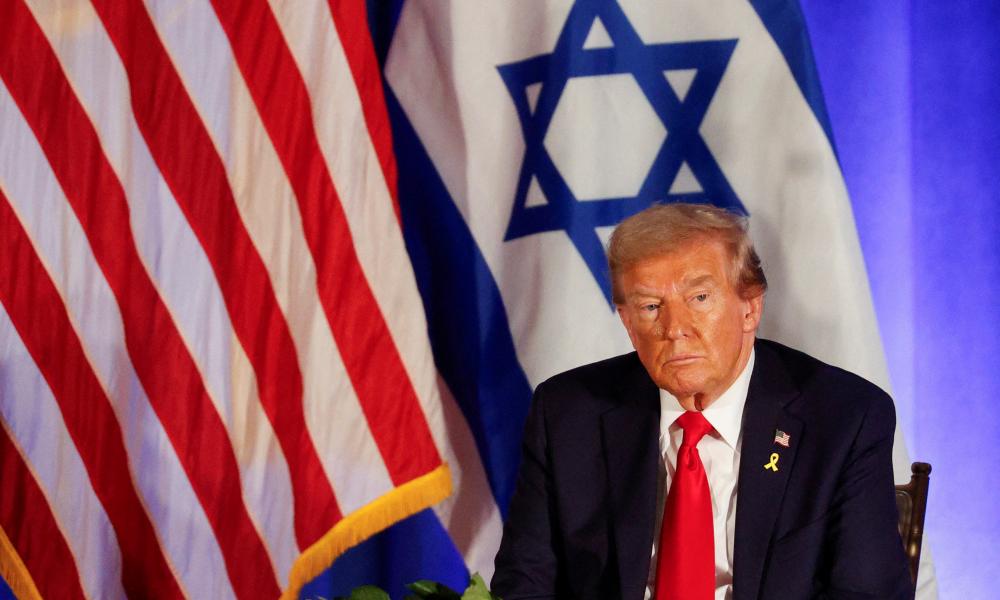Donald Trump commemorated the first anniversary of Hamas’s terrorist attacks on Israel, which resulted in significant casualties and hostages, by holding an event at his golf resort in Miami. He characterized October 7 as “one of the darkest days in all of history” and focused on honoring the victims and hostages. However, he quickly pivoted to political rhetoric, criticizing Vice President Kamala Harris and President Joe Biden for what he described as the “weakness” that allowed Hamas to feel emboldened to conduct such an attack. Addressing a crowd of around 300 supporters, primarily from the Jewish community, Trump claimed that the current wave of antisemitism could be attributed to the current administration’s actions and policies.
In his speech, Trump emphasized the scale of the tragedy caused by the October attacks, which left approximately 1,200 people dead and hundreds taken hostage. He noted the profound impact these events had on the global stage, ominously describing them as part of a “moment in horrible history.” Asserting that had he remained in the White House, the attacks would have been avoided, Trump expressed a desire to restore America’s strong alliance with Israel, which he alleged had weakened under the Biden administration. He asserted that under his leadership, America would not only be closer to Israel than ever but would also actively oppose any threats to the nation’s existence.
Trump’s speech stood in stark contrast to Harris’s earlier tributes in which she honored the lives lost and underscored the importance of ensuring Israel’s capacity for defense. While Biden conveyed his sorrow for the suffering on all sides of the conflict and condemned a significant rise in antisemitism in America since the attacks, Trump’s rhetoric was characterized by fiery declarations about unwavering American leadership and a renewed commitment to the Jewish state. He promised that he would not allow threats against Israel or target American allies, a theme that resonated deeply with his audience, who showed enthusiastic support.
At the Miami event, Trump was backed by various speakers, including Holocaust survivors and Jewish leaders, who contributed to the memorial atmosphere. Despite the solemnity of the occasion, many attendees were engaged by Trump’s combative and unapologetic stance on the political fallout from the Hamas attacks. Trump’s supporters expressed approval, citing a strong preference for his leadership style in contrast to that of Harris and Biden. Some attendees openly criticized Harris for her supportive stance towards Hamas, reaffirming their belief in Trump’s dedication to Israel.
Despite his assertive claims of being Israel’s staunchest advocate during his presidency, Trump’s past comments have drawn criticism. His remarks about Hezbollah and unsolicited opinions regarding Israeli leadership sparked significant backlash and were labeled “dangerous” by the White House. Moreover, amid his claims of popularity in Israel and his expectation for more support from Jewish voters, his approval ratings among this demographic remain low. During the event, whilst he touted his historical support for Israel, he refrained from repeating some of his more controversial assertions from previous speeches.
Many attendees resonated with Trump’s strong condemnation of adversaries of Israel and his promise to ensure its security if re-elected. Such affirmations helped foster an atmosphere of solidarity among supporters who are deeply concerned about the state of Israel and Jewish safety. In contrast, Harris focused on personal stories of victims and refrained from making politicized comments during her memorial address, exemplifying a different approach to the tragedy’s political implications. The divergent narratives illustrated the widening rift in American political attitudes towards Israel and underscore the politicization of national tragedies, reflecting broader national divisions as the election approaches.

